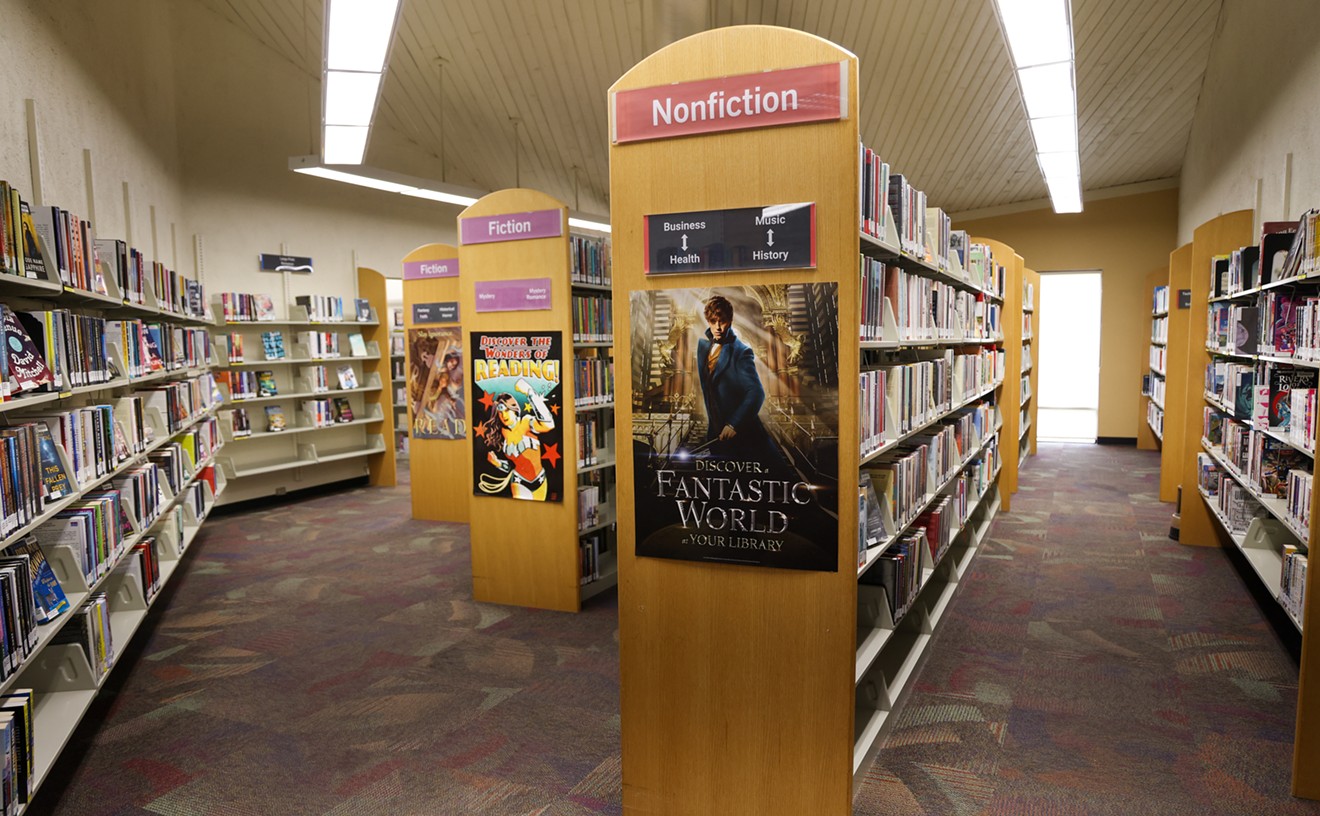The setup: Nina Raine's thought-provoking Tribes, about a typically troubled family whose deaf adult son, Billy, illuminates further hurt when he discovers the Deaf community he's been denied, has been acclaimed since it premièred in London in 2010. Winner of New York's 2012 Drama Desk Award for Best Play, the script not only presents its literal story with insight, humor, and sympathy, it raises issues of identity and communication with alternating subtlety and shock. And now we get to see it in Phoenix.
See also: Maple and Vine from Scottsdale's Theatre Artists Studio Is New and Sneakily Provocative
The execution: Tribes marks my first visit inside Phoenix Theatre's new Black Box space. The gorgeous lobby, bar, and patio remodel lead to a space that, depending how it's configured, can feel cramped and cheap with imperfect sightlines.
But once you're settled in your seat, it's cozy, engaging, and furnished with all the technical bells and whistles necessary to support a broad range of theater. (And it can be configured different ways, so I hope we get to see that as seasons pass -- otherwise the wobbly railings and folding chairs are in there to no apparent effect.)
Eric Beeck's set is simply gorgeous, and it hints at the symbolic nature of some of the parallels that will play out by the time the show is over. The furniture and appliances are a cheerful, messy yet harmonious mix of colors, style, and materials, the way you'd like to think of your own family, maybe: individuals with their own quirks and talents, cohabiting to function as something greater than the sum of its parts.
But then you see the books. So many books. Billy's cruelly intellectual, hyperverbal family isn't simply fond of words the way academic people are, the way some British people (a bit more than corresponding Americans) are. They rely on language -- language each of them strictly defines on his or her own terms -- the way they rely on oxygen, literally choking when they can't say what they wish.
So it's not just that books are everywhere in their home, as just another component of its arguably contradictory warmth and color. Books are everything; they hold up the kitchen countertops and constitute the walls. But the family doesn't think this is an arid, emotionally barren way of life, particularly not dad Christopher, who doesn't admit the validity of any thoughts or feelings that can't be put into words -- ideally the sort you can shout back and forth simultaneously and ignore when convenient. They think it's a normal, wonderful way to be, and Billy's parents chose long ago not to have him learn sign language (and, significantly, not to learn it themselves into the bargain).
Back to that cohabitation. Billy's just finished university and he's only recently moved back home for the time being. His older brother and sister happen to live at home as well, but they're no longer pleased to be there, getting constantly under each other's skins as well as their parents.' Throughout Billy's life, he's understood what he can catch through adroit lip-reading, and he's learned to speak clearly with the help of hearing aids, but we learn in the play's opening dinner scene that he isn't really included in the perpetual barrage of jokes and insults that fly among the other four, and he never has been. (I might be grateful for that, but not for having been denied the option to choose it for myself.)
Into this obviously precarious situation is dropped Sylvia, Billy's first girlfriend, who signs fluently because she was born to deaf parents but is now gradually losing her own hearing. Soon she'll be giving up her passport to the hearing community, and as if she didn't have enough on her plate, she gets to meet Billy's clueless, confrontational family, which dissects her like a rare bug. When Billy realizes what a large world of communication is available beyond his walls, he struggles with how to appreciate his new world without alienating his family or disregarding Sylvia's loss and depression.
The above description is not just the merest skeleton of the beginning of the plot. It's also only a fraction of what the play's about. Like lobes on a brain map, those broad issues light up unexpectedly with stimuli from practically every other moment in Raine's script, sparked by the subliminal meanings of everything from a handful of table knives to nominal Jewishness to a dish of fruit to a sliver in a foot to an opera score, a vase of tulips, and the hierarchy inherent in nearly every community.
And it's easy not to notice how spot-on the writing is, and that's only partly because that's how good writing should work. It's also subsumed by lovely, fierce performances from the cast, especially Willem Long as Billy, Marshall Glass (The Two Gentlemen of Verona) as his brother Daniel, and Gabrielle Van Buren (Cheaters) as Sylvia.
Daniel is generally miserable and frequently abrasive. He's been dumped by a girlfriend, his own "hidden" disabilities are being triggered by stress, and Glass brings a delicate touch to both Daniel's decompensation and his need for love.
Long and Van Buren both face enormous technical challenges as they must speak and sign with constantly varying levels of proficiency that are not necessarily second nature to either one of them. (Dialect coach Pasha Yamotahari and ASL consultant Missy Keast obviously worked very hard as well.) While doing that, they wrangle with Billy and Sylvia's own relationship and the quite different stages of each of their relationships with the Deaf community, and while doing all those things, they act, affectingly and engagingly, as two energetic young people in love.
The verdict: Despite the wordiness of this review, I've still told you barely anything about the experience of attending Tribes, and that's kind of the play's moral as well as the best reason to see it: You'll be forced (but enjoyably) to consider what you're saying, what you're hiding, what you're understanding, what you're missing, and where your responsibility lies. Unlike in real life, you won't be able to ignore or escape it.
Tribes continues through Sunday, February 16, at 100 East McDowell Road. Tickets start at $30. Purchase them here or call 602-254-2151.











